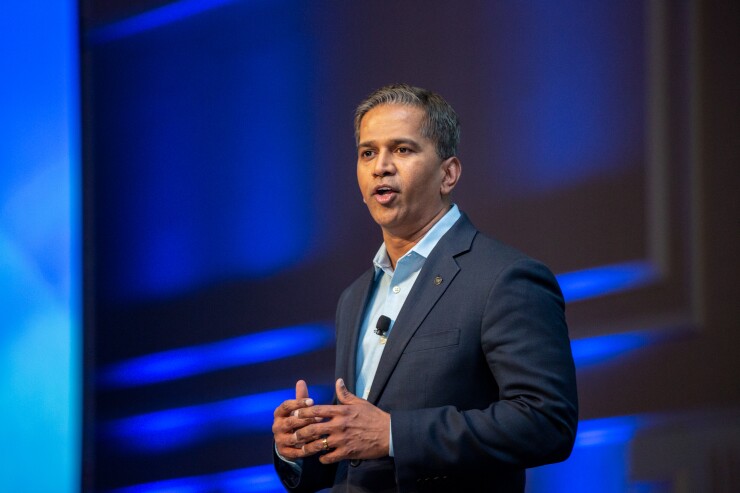JPMorgan Chase is expecting to spend $12 billion this year on technology — slightly more money than all of the assets of Berkshire Hills Bancorp in Massachusetts.
But Berkshire CEO Nitin Mhatre is undaunted. Mhatre, who took the reins of the $11.6 billion-asset company last year, has begun partnering with the same fintech sector that JPMorgan CEO Jamie Dimon is bent on defeating.
At a time when many small banks are being sold to larger competitors, rather than trying to keep pace in the technology race, Mhatre said fintech partnerships will help fend off potential buyers and avoid the temptation to acquire a smaller bank.

Bank M&A is a “distraction,” he said during a brief interview at the Consumer Bankers Association’s annual conference in San Antonio. He added that in the next one to three years “we’ll be in a better position to be a buyer or a seller.”
Berkshire took a hit related to M&A in 2020, reporting a $533 million loss that reflected a large goodwill impairment tied to past acquisitions.
Mhatre, who had previously done stints at Webster Bank and Citigroup,
Since then, the Boston-based parent company of Berkshire Bank has reached a
Shortly after Mhatre arrived, Berkshire reached a deal with the tech company Cirrus to provide a loan document portal the bank could use to handle requests for Paycheck Protection Program loans.
Mhatre now wants to grow Berkshire’s consumer unit, which currently accounts for about one-third of the bank’s business. The plans call for attracting more deposits — Berkshire has branches in Massachusetts, New York, Connecticut, Rhode Island and Vermont — and expanding in personal loans, which some banks have traditionally shunned.
In October, Berkshire partnered with
“We kind of decided that our destiny is going to be a high-performing, socially responsible community bank,” Mhatre said during a panel discussion at the conference, “but also be a tech-forward institution that thinks about, ‘How do we deliver exceptional experience to our customers?’”
At the same time, Mhatre vowed not to worry about how Berkshire can compete with “JPMorgan spending $12 billion in technology.”
Numerous other small banks are making a similar bet. For example,
For Berkshire, the digitally oriented consumer strategy offers a potential way to offset recent declines in other types of loans. Last year the company reported a 16% drop in total loans as Paycheck Protection Program loans ran off, and as mortgage volumes were hurt by higher borrowing costs.
Berkshire wants to start slowly in the personal lending business but is hitting its monthly production goals, Mhatre said at the conference. He did not disclose what those targets were.
Mhatre did address a criticism that Wall Street analysts have made — that relying too much on unproven fintech models that do not have several economic cycles of history behind them could prove risky.
“Every time you go into the Street, if you sign up with a new fintech partner, they're constantly worrying about, ‘Oh my God, do we have the experience? None of them have been through a cycle. How they would play out when the cycle turns bad?’ ” Mhatre said.
“We just have to understand the partners, understand what their models are, and understand how well tested those models are.”
Mhatre estimated that banks typically spend 70% to 75% of their technology budget on maintaining legacy systems. Those banks that want to build new digital systems are having a hard time competing for a small pool of workers who often prefer to work in Silicon Valley, he said.
That’s why he sees partnering as a smarter strategy.
“I think our time, capital and effort is best spent in partnerships, as opposed to trying to build platforms ourselves,” he said.





